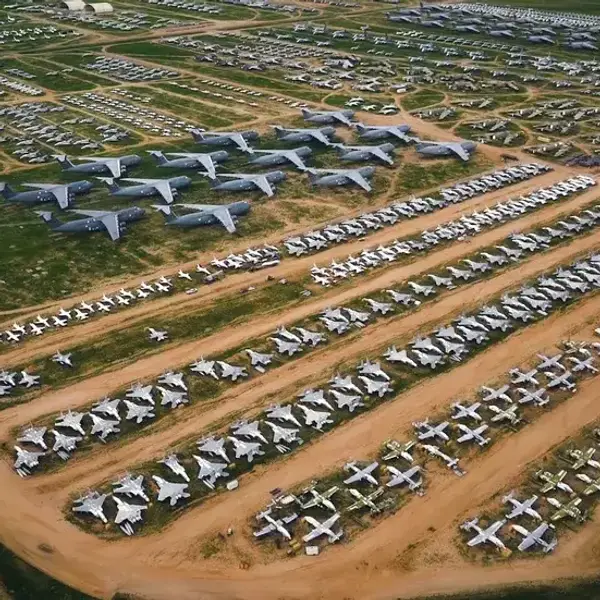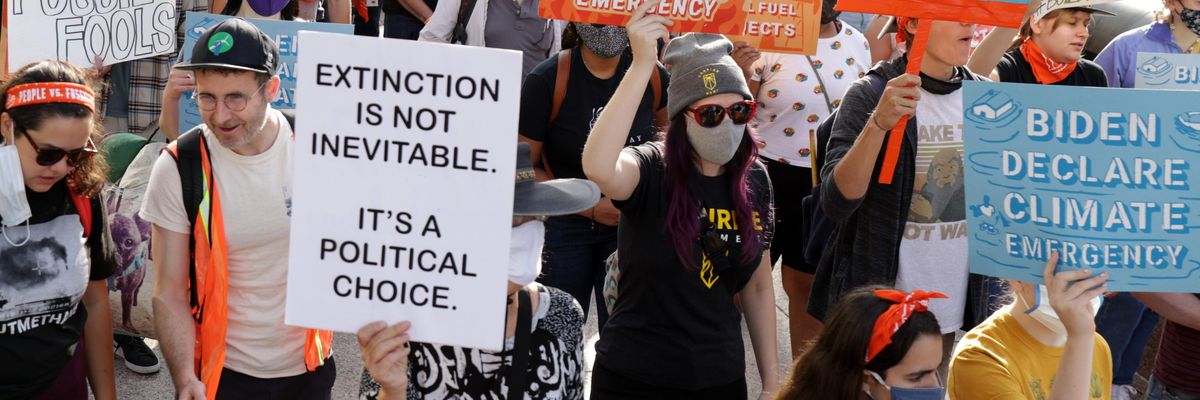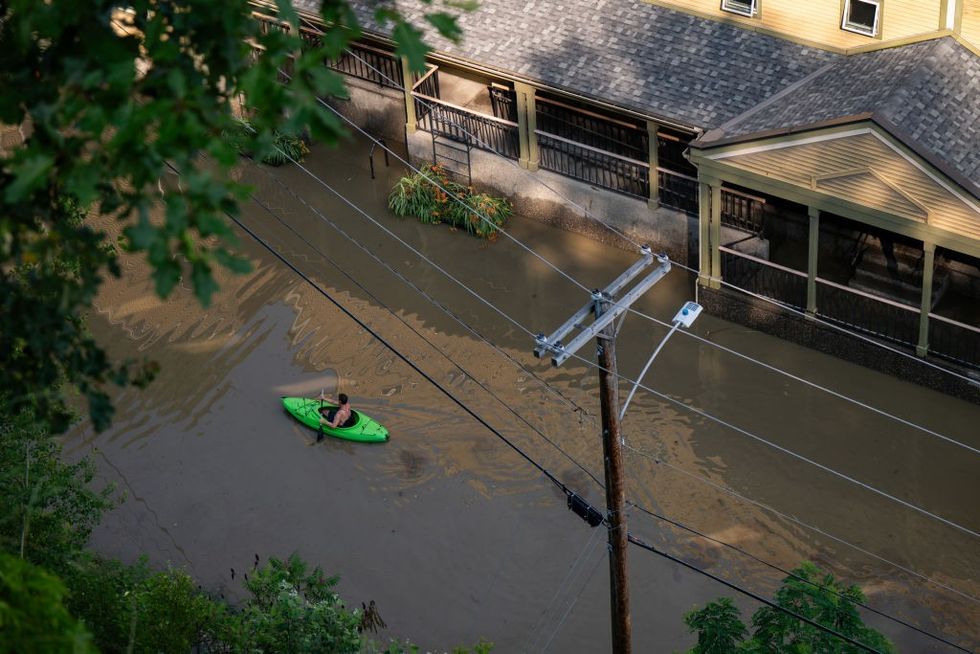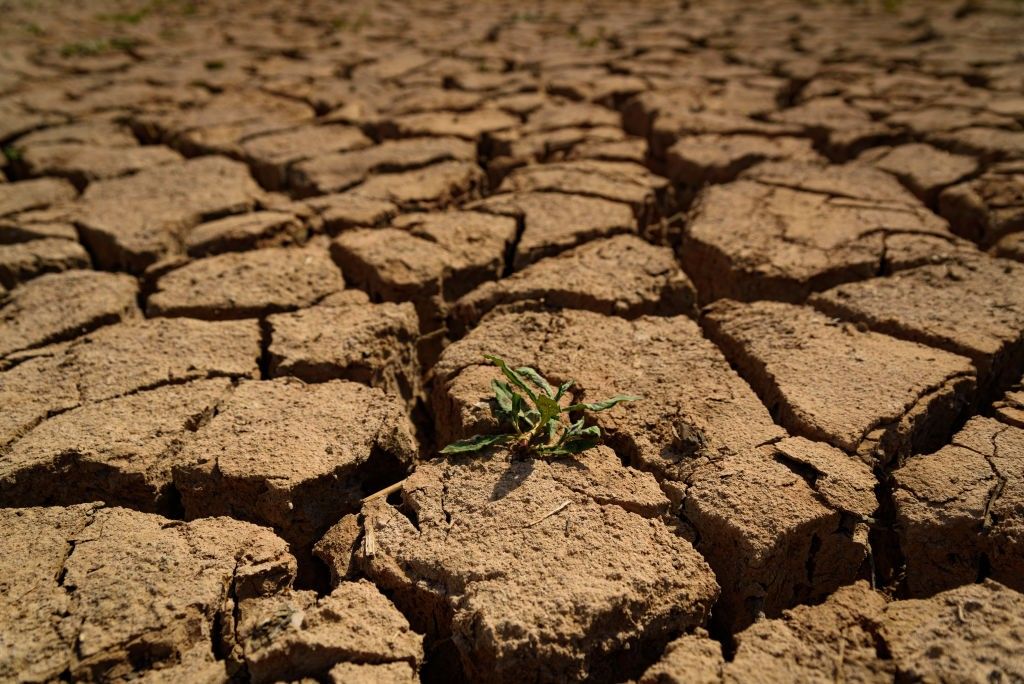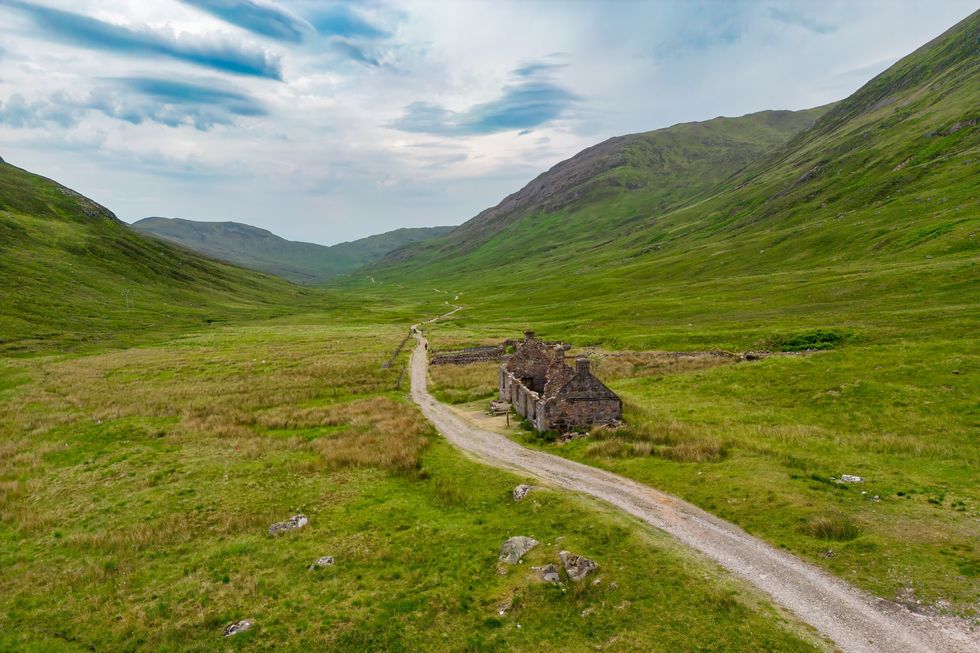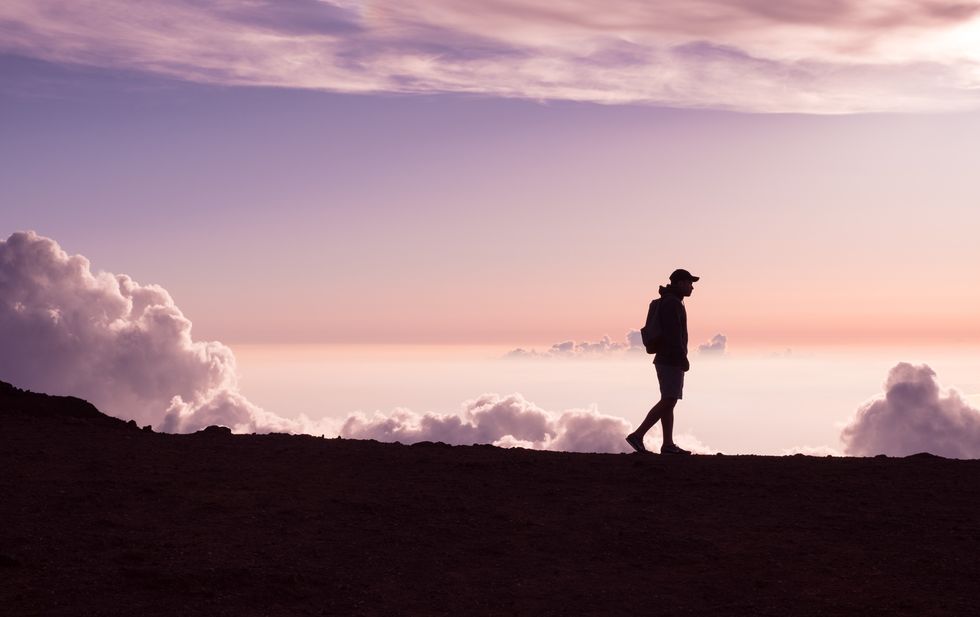Too hot.
Too dry.
Too many weapons.
This world needs changing.
But that’s too vague. After all, this world is already changing, just not in ways that are good for you and me.
You know the facts. July 2023 was the hottest month on record—ever—since we humans started keeping track of the temperature. And it’s only getting hotter. As Petteri Taalas, secretary general of the World Meteorological Organization, told The New York Times, the recent all-too-extreme weather is just “a foretaste of the future.”
Declaring War on Ourselves

In an aerial view, a kayaker paddles through the flooded waters of Elm Street on July 11, 2023, in Montpelier, Vermont.
(Photo: Kylie Cooper/Getty Images)
It’s not raining. Not at least where (and when) so many of us need it for drinking water or agriculture or recreation. Uruguay is out of water, with the government prioritizing data centers and multinational corporations instead of its thirsty people. In South Africa, the government is proposing purifying water from abandoned mines as a solution to a protracted water crisis and lack of drinking water. People in cities like Flint, Michigan, and Jackson, Mississippi, know what that feels like. It’s not just thanks to natural shortages, but mismanagement, corporate misdeeds, lack of investment in critical infrastructure, and racism, all mixed with climate change. And that’s only the beginning. Dozens of metropolises are in danger of ending up with contaminated or scarce drinking water (or both). Worse yet, when it does rain, it’s killing and destroying like the flash floods in Vermont a month or so ago or in China’s partly devastated capital, Beijing, and environs just recently.
And if nature taking aim at us weren’t enough, it seems that we’ve declared war on ourselves. Not just in places like Ukraine or Sudan, where the death tolls are in the thousands, but closer to home, too, where Americans are madly over-armed with nearly 400 million guns. I’m thinking about our cities and towns, highways and byways, schools and synagogues. After all, according to the Gun Violence Archive, such weaponry has killed more than 24,000 people so far this year alone (and that’s already more than the number of civilians killed in Ukraine and Sudan combined).
It’s as if we are at war, but the enemy is us.
Still, is it all so bad, so completely awful that it’s not even worth trying anymore?
It’s enough to make you hide under the covers, turn up your air conditioning (if you have it), and give up. But that, it turns out, just makes things worse. After all, cranking up the AC is part of what left us teetering at the edge of irreversible climate catastrophe. Meanwhile, research into loneliness suggests that isolation only creates more suspicion and further retards our ability to connect.
Still, is it all so bad, so completely awful that it’s not even worth trying anymore?
Here are the statistics that stay with me from a new study, as reported by The Guardian. “The world’s 7.6 billion people represent just 0.01% of all living things… Yet since the dawn of civilization, humanity has caused the loss of 83% of all wild mammals and half of plants, while livestock kept by humans abounds.” This staggering observation demonstrates the devastating impact human life has had on all life, which leads me to ask: With some large-scale tweaking and significant reorientation, could we humans have a similarly big impact in a positive way? Or at least a similarly big impact in not such a terribly negative one?
Reinventing Myself

A plant is growing among dry solid clumps of mud at the Sau water reservoir in Spain.
(Photo: Davide Bonaldo/SOPA Images/LightRocket via Getty Images)
Given the giant impression—think major meteor-sized explosion—we humans have made on Planet Earth, could we try something else?
Could we adapt? Change? Continue to evolve? Live differently?
As for myself, microscopic as I am in the giant scheme of things, I’ve made a few small changes in the last year that might have been helpful. As a start, I stopped eating gluten, cut out refined sugar, cut down on alcohol, and limited myself to one cup of coffee a day. Now, I only occasionally eat meat. These were just personal decisions, taken with my aging body and changing metabolism in mind, rather than ones meant for the health of the planet.
Sooner or later, we’re all going to have to reinvent ourselves—or else!
Still, small changes of this sort made me think differently, too. I stopped imagining the ideal breakfast as sausage, toast, and eggs, and started thinking about it as collard greens, brown rice, and eggs. There was both surprise and pride there, too, when I found that I could do it, that it wasn’t even very hard. It just took a little thought.
I went from drinking coffee as soon as I woke up until the pot was gone late in the day to making just a single cup. Period. And no, such small changes won’t mitigate climate change or much of anything else. Still, if you told me a year ago that I would be a gluten-free, one-cup-of-coffee kind of person, I would have laughed in your face.
Our planet needs this kind of small-scale change, but it needs so much more than that.
During the 1960s, Spain flooded an 11th-century town to harness hydroelectric power.. When the reservoir was full, you could still see the top of the ancient church tower sticking out of the water. That reservoir provided local drinking water, power, and a place for fishing and tourism. Today, however, in a distinctly overheated, drought-ridden, climate-change-battered Spain, that reservoir is almost empty and the remains of the town are completely dry. As the owner of a small kayaking business there told Bloomberg News, “Everything is very uncertain.” He used to take tourists out on the reservoir to paddle around the submerged ruins. “If the drought keeps on going,” he said, “we’ll have to reinvent ourselves somehow.”
And he’s not alone on this sweltering planet of ours. Sooner or later, we’re all going to have to reinvent ourselves—or else! We can’t keep being the human beings who live to destroy.
Bikes and Pedestrians Are Traffic, Too

An aerial view of the West Highland Way and a valley with farmhouse ruins near Fort William, Scotland.
(Photo: iStock/ via Getty Images).
Yesterday, I set off to live my day without a car. I rode my bike to an appointment a mile away from my house in New London, Connecticut. It was hot—low 90s and high humidity—but on my bike there was a breeze. Sweet shady swaths of wind! Then I rode another mile to the post office and back to board a shuttle across the Gold Star Bridge.
That shuttle is an adaptation, too. At the end of April, an accident involving a home-oil delivery truck killed the driver and engulfed the bridge in flames. Traffic was shut down for hours. The bridge reopened later that day to car traffic (120,000 of the gas-guzzlers every 24 hours), but three months later, the bike path for cyclists and pedestrians is still out of commission (no guzzling for us). Instead, I have to board a little bus that can carry two or three bicycles and a dozen pedestrians that gets us safely across the bridge. It’s free and on time and an acknowledgment that cyclists and pedestrians are “traffic,” too, but it burns gas and takes about three times as long as my usual pedal. My mother is in a nursing home on the other side of that bridge and seeing her is a big part of my days.
I used to bike to her. Now, I have to bike-shuttle-bike. No need for the gym. In this broiling summer, I come home completely drenched in sweat.
Walking is good for us in every single way and most of us simply don’t do enough of it.
Still, that shuttle aside, greater car-lessness (or fossil-fuel-burning-lessness) is doable, but it requires a mental change. It means accepting that it’s okay to be sweaty, to need a second shirt, to build in extra time to get from point A to point B (which, in fact, you really have to do with a car, too, given how bad traffic can be). I know everyone can’t ride a bike everywhere, but even doing a little of it reminds me that cars are a relatively recent invention and that we should be able to figure out new—or very old—ways of doing things.
Walking. Walking is good for us in every single way and most of us simply don’t do enough of it.
What else can I change? What else can I do? That urgent question asserts itself constantly, even though I know that I’m not exactly the world’s biggest polluter. The United States military has that scandalous distinction. As Neta Crawford points out in her 2022 book The Pentagon, Climate Change, and War: Charting the Rise and Fall of U.S. Military Emissions, the military has been responsible for as much as 80% of federal energy consumption since 2001—the year the Bush administration launched the Global War on Terror. So, really, one striking way to improve the planet is to work for nuclear disarmament, lower military spending, and a smaller U.S. military footprint throughout the world.
But while we are working on that, I can also be much more deliberate about driving (until we can afford to get an electric vehicle), especially since my family lives in a small town. The kids and I now walk the mile to their camp every day and my 9-year-old and 11-year-old are clearly up for walking on their own. Our commitment to walking only messed with us once, when the camp staff sent out the wrong morning meeting place and we arrived on foot three miles from where we were supposed to be. A nice mom offered to drive us the rest of the way.
Earlier this summer on vacation, I walked Scotland’s West Highland Way with my husband, my sister, my brother, and their spouses. The six of us trekked more than 90 miles along that ancient Scottish trail. We climbed mountains, followed the edges of lochs, crossed sheep fields, and cut through moors, including Rannoch, the largest wild area in Great Britain—more than 50 square miles of heather and bog.
Yes, we arrived from the U.S. by plane, but being outside all day on foot put me in a contemplative state of mind about our world. I was brought to tears by the beauty, the sheer scale and breadth of green that we encountered—until we turned a corner and were confronted with muddy destruction. The trees were gone, all of them, replaced by tiny saplings growing out of tire treads. This, it turned out, wasn’t just a forest. It was managed—trees produced to be cut down and milled by the massive Scottish timber industry.
In truth, the real world—the one that’s made our planet such a mess—was never far from us as we played at being hobbits, minstrels, or nomads. We walked through what seemed like unfamiliar landscapes, but each footfall followed so many others. I was never alone, even when I slowed down and gathered wool from the fences and weeds, tucking clumps of it into the side pocket of my backpack. I was, in fact, walking in the history of this unfamiliar land. Part of our route was along Wade’s Road, built by hundreds of soldiers over more than a decade to help the British put down the Jacobite Rebellions in the 1700s. They fought then over who chose their kings: God or humans! Wars back then were so silly, weren’t they? (Unlike those today, ha ha!)
There were drainage pipes and stairways and bridges, all evidence of the investment the Scottish government and park stewards had put into the West Highland Way as a generator of tourist dollars. And then there were the people. When we stopped for lunch or paused to take off our raincoats for the eighth or ninth time, groups of trekkers from Belgium, Holland, France, and so many other places passed by with quiet greetings.
The West Highland Way turns out to be a giant cash generator for the Scottish government. Those streams of people who come to walk there and stay in the bed-and-breakfast inns, drink in the pubs, and buy the band-aids (they call them “plasters”) and potato chips (“crisp packets”) inject 5.5 million pounds sterling into local economies along the way.
And in the end, all of it, sadly enough—walking or not—helps feed the burning of this planet.
One Foot in Front of the Other

A silhouette of person walking under white clouds.
(Photo: Jad Limcaco on Unsplash)
So how do we keep going when the future is so uncertain and full of dread? One advantage of just walking is you just walk. You don’t think about the future at all, just the next footfall. In our normal lives, we spend so much time trying to escape the elements—rain delays, events postponed, heat an ever-increasing factor in our summer planning—but in Scotland, we just kept walking.
Now that I’m home, I’ve done the same. I find walking in my community a great antidote to despair about the world. We don’t have AC, so these days, it’s often cooler (or at least breezier) outside our house than in it.
Who walks in this heat? Poor people, people with dogs, and health enthusiasts. I don’t feel hopeless when I’m walking. I feel connected, attentive, and activated. I’m too busy noticing the world, feeling my body, and keeping a lookout for cars (and bikes!).
I know that walking in an oven world doesn’t end wars, but it doesn’t use the oil that so many of our wars are fought over.
Admittedly, on a planet already heating to startling extremes, it’s not much and we desperately need the groups now organizing against climate change (just as we need governments and fossil-fuel companies to revolutionize their priorities and operations, as well as a dismantling of the military-industrial complex). But it’s not nothing either.
I know that walking in an oven world doesn’t end wars, but it doesn’t use the oil that so many of our wars are fought over. The climate won’t cool just because I’m walking more. The world-to-come for my children won’t broil less because of the tiny things I’m doing in my life. But it won’t get worse while I’m walking either. And in the quiet contemplation of walking, maybe a new idea will spring forth.
We can at least hope, as the work and the walking continue. It’s a scary world to walk through when you realize that the enemy is us.


